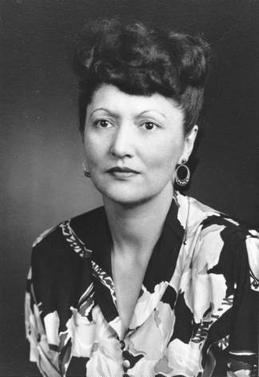Elizabeth Peratrovich – American Civil Rights Activist, President of Alaska Native Sisterhood, Tlingit Nation Member
 Elizabeth Wanamaker Peratrovich was an American civil rights activist, Grand President of the Alaska Native Sisterhood, and member of the Tlingit nation who worked for equality on behalf of Alaska Natives. Born a member of the Tlingit Nation, she was adopted by Andrew and Mary Wanamaker. Elizabeth, who spoke Tlingit and English, grew up poor while experiencing discrimination by the territory’s white residents. She was fortunate to attend Ketichikan High School, which had been integrated as a result of a lawsuit filed by a Tlingit leader. In late 1941, her and her husband moved to Juneau. There they spotted a “No Natives Allowed” sign on the door of the Douglas Inn across the channel from Juneau. With the United States having just entered World War II, they were outraged by this sign of discrimination. They wrote to Governor Ernest H. Gruening. “The proprietor of Douglas Inn does not seem to realize that our Native boys are just as willing as the white boys to lay down their lives to protect the freedom that he enjoys.” The sign, they said, was “an outrage.” That letter was the start of Elizabeth’s campaign, with the support of Governor Gruening, to pass an anti-discrimination bill through the Territorial Legislature. In 1943, however, it failed in the House by a tie vote. Despite this disappointment, Elizabeth and her husband traveled around the State urging Native Americans to join their fight for justice.
Elizabeth Wanamaker Peratrovich was an American civil rights activist, Grand President of the Alaska Native Sisterhood, and member of the Tlingit nation who worked for equality on behalf of Alaska Natives. Born a member of the Tlingit Nation, she was adopted by Andrew and Mary Wanamaker. Elizabeth, who spoke Tlingit and English, grew up poor while experiencing discrimination by the territory’s white residents. She was fortunate to attend Ketichikan High School, which had been integrated as a result of a lawsuit filed by a Tlingit leader. In late 1941, her and her husband moved to Juneau. There they spotted a “No Natives Allowed” sign on the door of the Douglas Inn across the channel from Juneau. With the United States having just entered World War II, they were outraged by this sign of discrimination. They wrote to Governor Ernest H. Gruening. “The proprietor of Douglas Inn does not seem to realize that our Native boys are just as willing as the white boys to lay down their lives to protect the freedom that he enjoys.” The sign, they said, was “an outrage.” That letter was the start of Elizabeth’s campaign, with the support of Governor Gruening, to pass an anti-discrimination bill through the Territorial Legislature. In 1943, however, it failed in the House by a tie vote. Despite this disappointment, Elizabeth and her husband traveled around the State urging Native Americans to join their fight for justice.
During the public comment period, she stated, “I would not have expected that I, who am barely out of savagery, would have to remind the gentlemen with 5,000 years of recorded civilization behind them of our Bill of Rights. Do your laws against larceny and even murder prevent those crimes? No law will eliminate crimes but at least you as legislators can assert to the world that you recognize the evil of the present situation and speak your intent to help us overcome discrimination.”
On February 16, 1945, Governor Gruening approved the country’s first anti-discrimination law. “All citizens,” section one stated, “shall be entitled to the full and equal enjoyment of accommodations, advantages, facilities and privileges of public inns, restaurants, eating houses, hotels, soda fountains, soft drink parlors, taverns, roadhouses, barbershops, beauty parlors, bathroom, resthouses, theaters, skating rinks, cafes, ice cream parlors, transportation companies, and all other conveyances and amusements, subject only to the conditions and limitations established by law and applicable alike to all citizens.” Violators would be subject to imprisonment for up to 30 days or fined up to $250.
Nineteen years after Governor Gruening signed the law in Alaska, President Lyndon B. Johnson signed the landmark Civil Rights Act of 1964, which banned discrimination throughout the country on the basis of race, color, religion, sex, or national origin. In February 2020, the 75th anniversary of the bill the U.S. Mint released five million $1 coins commemorating the Anti-Discrimination Law of 1945, the latest in a series of coins authorized by the Native American $1 Coin Act. One side (tails) featured a portrait of Elizabeth Wanamaker Peratrovich, the reverse side (heads) featured the image of Sacagawea.